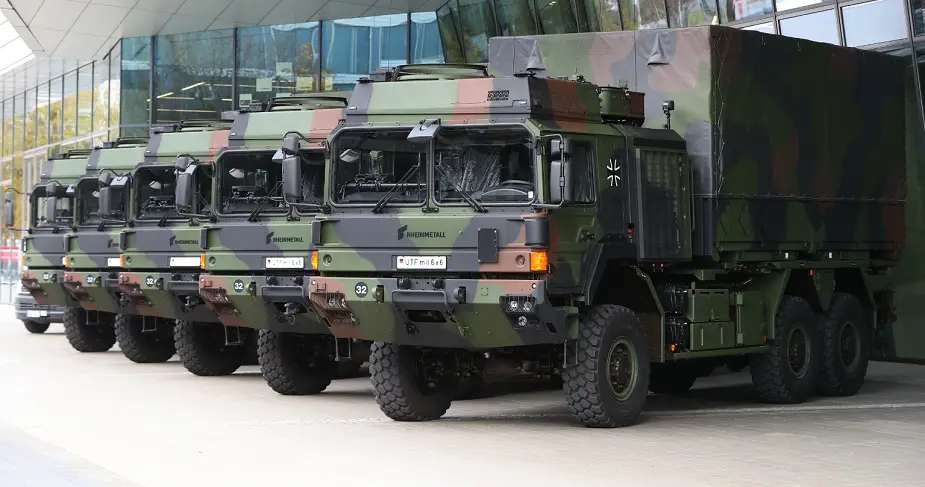Breaking news
Rheinmetall transfers 20 new military trucks to the Bundeswehr.
The transfer to the Bundeswehr of twenty factory-fresh military trucks in Munich marks the start of a new chapter in the history of German Army logistics. The Bundeswehr’s fleet will be steadily augmented by a total of up to 2,271 new trucks, which will gradually replace Germany’s trusty but aging Kat I mil gl vehicles.

(Picture source: Rheinmetall )
Attending the symbolic handover of the keys at the MAN Forum in Munich were representatives of the Federal Office for Bundeswehr Equipment, Information Technology and In-service Support (BAAINBw, i.e. the German procurement authority) and the future user, the German Bundeswehr. Headquartered in Munich, the joint venture company Rheinmetall MAN Military Vehicles (RMMV) is one of the world’s foremost makers of military wheeled vehicles. On behalf of the customer, Rainer Krug, head of BAAINBw’s ground support department, took possession of the symbolic key, which he then immediately handed over to the Bundeswehr, represented by Major General Stefan Linus Fix of the Joint Support Services Command, and Colonel Ralf Albert Nau of the German Army Command. In summer 2017, BAAINBw awarded Rheinmetall MAN Military Vehicles a framework contract to supply the Bundeswehr with trucks from the HX2 family worth a total of €900 million. As a first step, an order was issued for 558 trucks, including special tools and training support.
In Bundeswehr and BAAINBw parlance, the project is known as the “UTF (Ungeschützte Transportfahrzeuge) mil gl in den Zuladungsklassen 5t und 15t”, which means “unprotected transport vehicle, military/all-terrain load classes 5t and 15t”. It is true that these versatile, high-performance 6x6 and 8x8 trucks currently feature an unprotected driver’s cab. However, the powerful chassis is designed to enable subsequent replacement with a highly protected armoured cab, likewise made by Rheinmetall. As a result, these “Unprotected Vehicles” can be transformed into superbly protected vehicles at any time, which, despite the additional weight, remain as manoeuvrable and flexibly deployable as ever, while providing their crews with excellent protection when deployed in harm’s way. At the handover ceremony, Rheinmetall chief executive Armin Papperger stated how pleased he was to see the Bundeswehr joining the circle of HX2 users. In recent years, among other nations, the United Kingdom, Australia, New Zealand have all procured comparable RMMV vehicles, as have Norway and Sweden.
As Mr Papperger put it, “We are very happy that the Bundeswehr is now part of this growing family. In a joint User Nations Group, we work closely with the armed forces of these nations to continuously improve the vehicles, to gain from each other’s experience and to create a new common logistics capability – one that will benefit everybody.” He went on to say that, “We at Rheinmetall see it as our duty to supply our men and women in uniform with the best-possible equipment to help them perform their missions. The ‘Unprotected Transport Vehicle’ project is one which all of us at Rheinmetall can be particularly proud of.” For his part, Michael Wittlinger, managing director of Rheinmetall MAN Military Vehicles, expressed his pride in the achievement, too, directing his thanks to everyone involved in the project, on the customer and contractor sides alike. “In a very short timeframe”, declared Mr Wittlinger, “outstanding partnership achieved great things here – the results speak for themselves.”
A vehicle specially developed for military users, the HX2 has been systematically perfected from the very outset. RMMV development engineers consistently adhered to a family concept, resulting in major advantages with respect to the supply of spare parts, training and interoperability. Assuring maximum mobility and robust performance under rugged conditions were also key design goals. Production is already in full swing. In 2018, the first delivery year, Rheinmetall is already well ahead of its target output figure of ninety vehicles. As things stand, 110 UTF trucks will thus be ready for delivery this year.


























